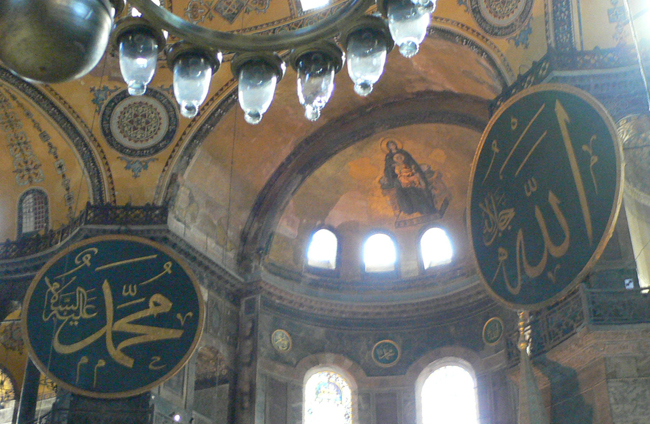-

 Know, the true nature of your Beloved.
Know, the true nature of your Beloved.
In His loving eyes, your every thought,
Word and movement is always –
Always Beautiful.
~ Hafiz

The Ninety Nine Beautiful Names
It is God, or Allah, Exalted and Glorified be He, who named Himself with the Ninety Nine Beautiful Names.
God says, ”To Allah belongs all the Beautiful Names, so call out to Him with them.” (Quran 7:180)
These Names have been divinely revealed to the Prophet Muhammad. The Prophet said, “Allah has Ninety Nine Names; whoever enumerates them will enter Paradise.” This not only means to mention them but to try to understand their meanings and reflect upon them in one’s heart, words and deeds.
Reflecting upon these Names can lead us to love God, being the highest form of worship – as God says in the Quran, “Allah will bring a people whom He will love and they will love Him”. His Names can also prompt us to stand in awe of Him, as He is aware of all our actions, apparent and hidden. They also point to God’s forbearance and omnipotence. Another response is to recognize God’s greatness and supreme majesty, which includes His absolute power over everything, every being, every action and His immense wisdom which has perfected everything He has created. Belief in God’s greatness causes us to trust Him and leads to an inner peace and tranquility.
Although we don’t know any other divine Names apart from these Ninety Nine, the extent of God’s Names are known exclusively by Him and are not confined to a specific number. One Name, the Name of His essence, is hidden in the Quran.
One of mankind’s greatest saints, Muhiyiddin Ibn al-Arabi, known as the ‘Greatest Master’, contemplated the Ninety Name Beautiful Names in depth. He said, “if anything of himself veils him from seeing the whole, he has committed a crime against himself, and he is not a perfect man … by perfection is meant knowledge of self, and knowledge of the Lord. Adam’s original disposition was his knowledge of God, so he knew the original disposition of all things. That is why God says, “He taught Adam all the Names”.
Ibn al-Arabi’s works describe the goal of humanity – ‘al-insan al-kamil’, the station of the ‘perfect man’, which is achieved by a person embracing and exhibiting the constructive characteristics of the Beautiful Names. Mawlana Shaykh Hisham explains this in another way, that the Sufis are striving for the station of Ihsan, that of perfected character. He reminds us of the quote from the Holy Prophet, Muhammad, who said, “I came to perfect your character”.
Then Ibn al-Arabi looks at mankind’s endeavor in a different light, that the goal of striving on the path is not to acquire God’s attributes for oneself, but to negate our own ego driven desires. The aim of the seeker is not to gradually grow in stature until he or she becomes a kind of demigod trying to rival God Himself – on the contrary, one is gradually reduced in stature until there is nothing left of the self. But since nothing belongs to mankind in the first place, once he or she effaces their own self, there remains only that which truly is: the face of God, the Divine Form, the Reality of Muhammad.
Both Mawlana Shaykh Hisham and Muhiyiddin Ibn al-Arabi agree that the way for the Sufi seeker lies in the Quran and the sayings and example of the Holy Prophet Muhammad, where he displayed the noble characteristics of these Names in his perfect behavior. This remains a huge blessing, because the behavior and actions of the Prophet were recorded in detail, providing an example to us to follow today.
As a point of interest, upon his passing, the body of Shaykh Abdullah ad-Daghestani, the teacher of Shaykh Hisham, was kept in state at the Mosque of Muhiyiddin Ibn al- Arabi in Damascus.
“In the Name of God, the Lord of Mercy, the Giver of Mercy.”
“Say: Call upon Allah or call upon The Compassionate: by whatever Name you call upon Him, to Him belong the most Beautiful Names.” (Quran 17:110)
“He taught Adam all the Names.” (Quran 2:31)
“Conform yourselves to the character of God.” Hadith of the Prophet (related by Abu Nu’aym).
And God knows best.
